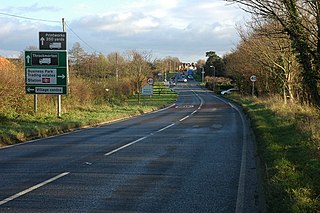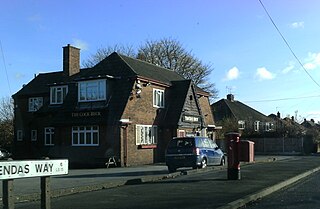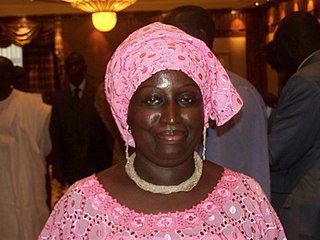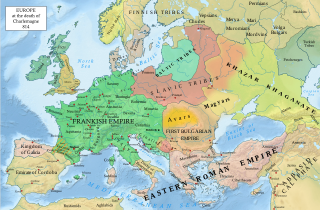Oswiu, also known as Oswy or Oswig, was King of Bernicia from 642 until his death. One of the sons of Æthelfrith of Bernicia, he became king following the death of his brother Oswald in 642. Unlike Oswald, Oswiu struggled to exert authority over Deira, the other constituent kingdom of medieval Northumbria, for much of his reign.

Wulfhere or Wulfar was King of Mercia from 658 until 675 AD. He was the first Christian king of all of Mercia, though it is not known when or how he converted from Anglo-Saxon paganism. His accession marked the end of Oswiu of Northumbria's overlordship of southern England, and Wulfhere extended his influence over much of that region. His campaigns against the West Saxons led to Mercian control of much of the Thames valley. He conquered the Isle of Wight and the Meon valley and gave them to King Æthelwealh of the South Saxons. He also had influence in Surrey, Essex, and Kent. He married Eormenhild, the daughter of King Eorcenberht of Kent.

The Battle of the Winwaed was fought on 15 November 655 between King Penda of Mercia and Oswiu of Bernicia, ending in the Mercians' defeat and Penda's death. The battle marked the effective demise of Anglo-Saxon paganism.

The Battle of Maserfield, was fought on 5 August 641 or 642, between the Anglo-Saxon kings Oswald of Northumbria and Penda of Mercia, ending in Oswald's defeat, death, and dismemberment. The battle was also known as Cogwy to the Welsh, with their countrymen from Pengwern participating in the battle, probably as allies of the Mercians. Bede reports the commonly accepted date given above; the Welsh Annales Cambriae is generally considered incorrect in giving the year of the battle as 644. The site of the battle is traditionally identified with Oswestry; arguments have been made for and against the accuracy of this identification.
Pybba (570?–606/615) was an early King of Mercia. He was the son of Creoda and father of Penda and Eowa. Unusually, the names Pybba and Penda are likely of British Celtic, rather than Germanic, origin.
Œthelwald was a King of Deira. He was the son of King Oswald of Northumbria, who was killed at the Battle of Maserfield in 642.
Cenwalh, also Cenwealh or Coenwalh, was King of Wessex from c. 642 to c. 645 and from c. 648 until his death, according to the Anglo-Saxon Chronicle, in c. 672.
Cearl was an early king of Mercia who ruled during the early part of the 7th century, until about 626. He is the first Mercian king mentioned by Bede in his Historia ecclesiastica gentis Anglorum. Bede was a Northumbrian who was hostile to Mercia, and historian Robin Fleming speculates that as "ceorl" means "rustic" in Old English, his name may have been a joke.
The Socialist Party of Senegal is a political party in Senegal. It was the ruling party in Senegal from independence in 1960 until 2000. In the 2000 presidential election, the party's candidate and previous incumbent, Abdou Diof, was defeated by the leader of the Senegalese Democratic Party, Abdoulaye Wade. Ousmane Tanor Dieng has been the First Secretary of the party since 1996 and was the presidential candidate in 2007 and 2012. The best-known figure of the Socialist Party was Léopold Sédar Senghor, the first President of Senegal.

Pinvin is a village in Worcestershire, England, a little to the north of Pershore, about 7 1⁄2 miles (12.1 km) south-east of Worcester, and about 6 miles (9.7 km) north-west of Evesham and lies on the crossroads of the A44, A4104 and B4082. It is also the location of Pershore railway station. The village has a church, a grocery store and a pub. It also has a first school and a middle school ; pre-school activities take place in the village hall.

Pendas Fields is a private, suburban housing estate in Leeds, West Yorkshire, England. It is considered part of Cross Gates, as is Manston. Swarcliffe is close, and Cock Beck runs nearby. The area falls within the Cross Gates and Whinmoor ward of the Leeds Metropolitan council.

God's Bits of Wood is a 1960 novel by the Senegalese author Ousmane Sembène that concerns a railroad strike in colonial Senegal of the 1940s. It was written in French under the title Les bouts de bois de Dieu. The book deals with several ways that the Senegalese and Malians responded to colonialism. There are elements that tend toward accommodation, collaboration, or even idealization of the French colonials. At the same time the story details the strikers who work against the mistreatment of the Senegalese people. The novel was translated into English in 1962 and published by William Heinemann as God's Bits of Wood as part of their influential African Writers Series.
Alhfrith or Ealhfrith was King of Deira under his father Oswiu, King of Bernicia, from 655 until sometime after 664. Appointed by Oswiu as a subordinate ruler, Alhfrith apparently clashed with his father over religious policy, which came to a head at the Synod of Whitby in 664. After this, Alhfrith disappears from the historical record.
Ceolwald may have been King of Mercia c.716 AD.

The Senegal women's national basketball team is the national basketball team representing Senegal at world and continental basketball competitions for women. It is administered by the Fédération Sénégalaise de Basket-Ball.
According to some early medieval sources, the Siege of Exeter or Siege of Caer-Uisc was a military conflict that took place in or around 630 CE, between the Mercians, led by Penda of Mercia, and the Britons occupying Caer-Uisc (Exeter) in the kingdom of Dumnonia. Penda is said to have laid siege to the town until the exiled British High King Cadwallon of Gwynedd, arrived to confront him. An alliance between British and Mercian forces followed, secured by Cadwallon's marriage to Alcfrith, Penda's sister, and they marched north to face the armies of Northumbria at the Battle of Cefn Digoll.

Penda Mbow, born in 1955, is a historian, an activist, and a Senegalese politician. Minister of Culture of Senegal for several months in 2001, she is a professor at Université Cheikh Anta Diop in Dakar and president of Mouvement citoyen.

Pendas is a village in Golab Rural District, Barzok District, Kashan County, Isfahan Province, Iran. At the 2006 census, its population was 134, in 53 families.










